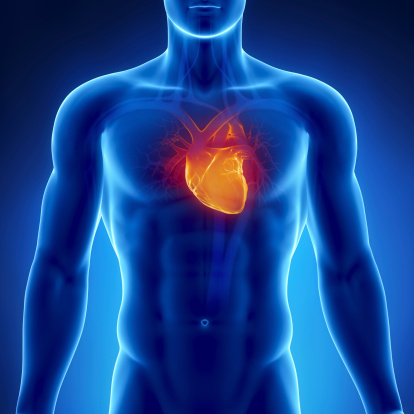Stay Informed
Popular Articles
- Hiatal Hernia: Hidden Cause of Chronic Illness
- Small Intestinal Bacterial Overgrowth (SIBO)
- Applied Lymphology: Unlocking the Secret to Pain Relief
- An Introduction to Constitutional Iridology
- The Low Down on Liver Detoxification
- An Energetic and Emotional Approach to Cancer
- Fat Facts
- Marrow in the Bones
- Blood Type and Nutrition
- Cardiac Herbs: Beyond Hawthorn
Quick Search
The School of Modern Herbal Medicine




Let's Stop Attacking Our Hearts
- 8/10/2009
- Categorized in: General Health
This is page 1 of a three-part article.
When someone says “heart,” does it conjure up the image of a pump? Most likely not. While Western science has told us that the organ beating inside our chests is just a pump, our cultural use of the word "heart" suggests much more. For instance:
 We talk about “giving our heart” to someone when we fall in love.
We talk about “giving our heart” to someone when we fall in love.
We feel our “heart breaking” when relationships end.
We say “take heart” to encourage someone.
We “take things to heart” when we allow them to affect us emotionally.
We “have a heart” when we show compassion for others.
We “harden our heart” when we stifle good feelings for someone because of hurt and betrayal.
We refer to love and relationships as “matters of the heart.”
All of these examples show that we subjectively experience our heart as much more than a mechanical pump for blood. The heart is deeply connected with our feelings and our relationships with others. However, when the heart is diseased, most of us tend to completely ignore this deep emotional experience of the heart and act as if our feelings have little or nothing to do with the health of our heart.
I believe that when it comes to treating heart problems, addressing these emotional and relationship issues is just as important as working on the heart nutritionally. I have often told people that “the heart knows things the brain does not.” I know this because 22 years ago I started doing emotional healing work. I've had a lot of success working with clients on both the emotional and physical levels at the same time, but I've lacked the objective language needed to explain some of what my heart understands.
Recently, however, I came across a book called The Secret Teachings of Plants: The Intelligence of the Heart in the Direct Perception of Nature by Stephen Harrod Buhner. This remarkable book provided me with the understanding I needed to vocalize the truths my own heart had been teaching me. The fact is, science has confirmed our heart is much more than a pump. Let me share what I've learned.
The Heart is More Than a Pump
We've all been taught that the heart pumps the blood through the circulatory system, but according to Buhner, the blood starts circulating in the fetus before the heart starts pumping. Furthermore, modern research shows that the heart is simply not a strong enough pump to move the blood through the tens of thousands of miles of blood vessels in the body.
More recent research shows that the blood travels on an electromagnetic wave. It moves in a vortex, like water spiraling down a drain. The spinning red blood cells act like an electromagnetic generator, maintaining the wave. The heart sets the pace for this wave and the entire body responds to it.
This adds new meaning to the idea of pulse diagnosis. Instead of just measuring blood pressure and heart rate (like modern medicine does), the traditional art of pulse diagnosis is sensing this wave moving through the body. This is how the pulse provides information about the health of the whole body.
Our new understanding of the heart doesn't stop here. The heart is also a brain. Again, according to Buhner, the heart is 60-65% nerve cells. So, it is wrong to think of the heart as simply a muscle, because the heart is more of a brain than a muscle. The heart has intelligence and memory. In its own unique way it literally thinks.
An interesting book which substantiates this is The Heart's Code by Dr. Paul Pearsall. Dr. Pearsall has studied the phenomenon of memory transfer in organ transplant patients. People can suddenly acquire new food preferences, interests and other memories from the donors of organs. The heart appears to be particularly prone to memory transfer and people who receive heart transplants often undergo major emotional and personality shifts. The book contains fascinating stories about this.
Of course, the heart doesn't think in words. The heart thinks in feelings, which are both non-linear and holographic. This makes it difficult to explain in words what our heart is thinking. Of course, this is what drives the great poets, artists and musicians—their art is born of their struggle to communicate information in the language of the heart, rather than the language of the brain.
Yet there is more! The heart is also a gland. It secretes hormones that communicate with the rest of the cells of the body. So, the heart has a major impact on the health of the body on many levels, and the best way to understand our heart is to start understanding its language—the language of emotions and feelings.
Speaking the Language of the Heart
 The above information helps us gain a new understanding of our emotions. When I started doing emotional healing work, I learned that it was possible to empathetically tune into another person's emotions and gain powerful insights into what was troubling them. I didn't know how this was taking place, but I experienced it in very profound ways.
The above information helps us gain a new understanding of our emotions. When I started doing emotional healing work, I learned that it was possible to empathetically tune into another person's emotions and gain powerful insights into what was troubling them. I didn't know how this was taking place, but I experienced it in very profound ways.
The Secret Teachings of Plants helped me understand objectively what I've been experiencing subjectively. This understanding begins with the knowledge that heart cells entrain on one another. This means that they try to synchronize their beating via their shared electromagnetic pulses.
Buhner says that a single heart cell will beat erratically and rapidly die. Put another heart cell near it (not touching it, just near it) and the two cells will synchronize their beats and live longer. Heart cells do this because they both send and receive electromagnetic impulses. The heart's electromagnetic field can be detected via electronic instruments up to five feet away from the body, but Buhner provides evidence that living things can receive these same electromagnetic pulses at much greater distances.
The bottom line is that the heart is both broadcasting the electromagnetic frequencies we call emotions and it is also receiving them. These electromagnetic frequencies carry very subtle and complex messages, not only from other people, but also from animals, plants and even non-living things.
We have all experienced this subjectively. We have “felt” someone's anger before they verbalized it. We have sensed the presence of someone who is loving and kind. We have felt both good and bad “vibes” from certain environments. We also know the good feeling we get when our heart entrains, that is, synchronizes its beating with someone else. We feel “in sync” with this person and “in tune” with them.
This is the meaning of the word compassion. Passion is emotion, and the word compassion refers to “common passion” or shared feelings. When we have empathy for someone else's emotional experience we are able to have compassion for them. We can allow our hearts to be open to this non-verbal exchange of information.
I could write a lot more about this, but I need to move on. I suggest you read Buhner's book. In fact, read several of his books. He's got some amazing insights into herbalism and healing, and he explains how native healers “talked” to plants through their heart and learned how to use them.
